
Thaddeus “Thad” Mosley is a self-taught African American sculptor. Earning a living throughout his adult life as a postal worker in Pittsburgh, Pennsylvania, so that he could support his family by day and work as a sculptor by night, he has evolved an individual and powerful African American voice. He worked alone, patiently developing a sculptural language absolutely his own, yet traceable to his primary sources of inspiration, the vitality of African art and American jazz on the one hand, and on the other, two twentieth-century artists, the Romanian sculptor Constantin Brancusi and the Asian American sculptor Isamu Noguchi.
From the beginning Thad Mosley has been a carver. His materials have always been those “at hand,” logs from the trees of his native Western Pennsylvania, stones from the sites of demolished buildings in Pittsburgh, and metals from local scrapyards. Finding within each log or block of stone an essential vitality, his carvings invariably bear a syncopation of chisel marks evoking the rhythms and surging freedoms of jazz. Mosley’s perseverence and his pride in who he is offer an inspiring example of the unquenchable spirit of a true artists.
This short book introduces the life and work of this remarkable man. Davis Lewis, architect, writer, and painter, has been a friend of the artist for twenty-five years. His narrative is distilled from hours of taped interviews with Thad Mosley, as well as from a deep understanding of his art and influences. Lonnie Graham is a nationally known African-American photographer.
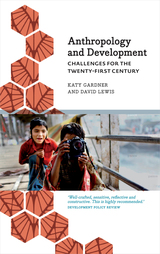
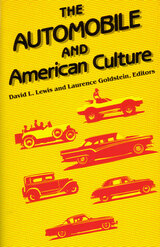
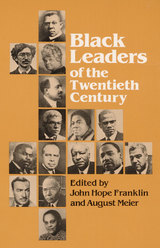
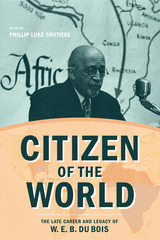
From his birth in 1868 until his death in 1963, Du Bois sought the liberation of black people in the United States and across the world through intellectual and political labor. His tireless efforts documented and demonstrated connections between freedom for African-descended people abroad and black freedom at home.
In concert with growing scholarship on his twilight years, the essays in this volume assert the fundamental importance of considering Du Bois’s later decades not as a life in decline that descended into blind ideological allegiance to socialism and communism but as the life of a productive, generative intellectual who responded rationally, imaginatively, and radically to massive mid-century changes around the world, and who remained committed to freedom’s realization until his final hour.



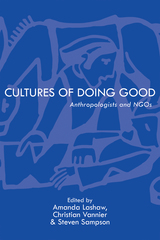
Cultures of Doing Good: Anthropologists and NGOs serves as a foundational text to advance a growing subfield of social science inquiry: the anthropology of nongovernmental organizations (NGOs). Thorough introductory chapters provide a short history of NGO anthropology, address how the study of NGOs contributes to anthropology more broadly, and examine ways that anthropological studies of NGOs expand research agendas spawned by other disciplines. In addition, the theoretical concepts and debates that have anchored the analysis of NGOs since they entered scholarly discourse after World War II are explained.
The wide-ranging volume is organized into thematic parts: “Changing Landscapes of Power,” “Doing Good Work,” and “Methodological Challenges of NGO Anthropology.” Each part is introduced by an original, reflective essay that contextualizes and links the themes of each chapter to broader bodies of research and to theoretical and methodological debates. A concluding chapter synthesizes how current lines of inquiry consolidate and advance the first generation of anthropological NGO studies, highlighting new and promising directions in this field.
In contrast to studies about surveys of NGOs that cover a single issue or region, this book offers a survey of NGO dynamics in varied cultural and political settings. The chapters herein cover NGO life in Tanzania, Serbia, the Czech Republic, Egypt, Peru, the United States, and India. The diverse institutional worlds and networks include feminist activism, international aid donors, USAID democracy experts, Romani housing activism, academic gender studies, volunteer tourism, Jewish philanthropy, Islamic faith-based development, child welfare, women’s legal arbitration, and environmental conservation.
The collection explores issues such as normative democratic civic engagement, elitism and professionalization, the governance of feminist advocacy, disciplining religion, the politics of philanthropic neutrality, NGO tourism and consumption, blurred boundaries between anthropologists as researchers and activists, and barriers to producing critical NGO ethnographies.

The Gê-speaking tribes of Central Brazil have always been an anomaly in the annals of anthropology; their exceedingly simple technology contrasts sharply with their highly complex sociological and ideological traditions. Dialectical Societies, the outgrowth of extended anthropological research organized by David Maybury-Lewis, at long last demystifies Gê social structure while modifying and reinterpreting some of the traditional ideas held about kinship, affiliation, and descent.
Each of the seven contributors deals with a different lowland tribe, butall of them address an ideological focus on the dualistic tribal organization that is here defined as fundamental to the Gê As a collection, their work comprises a substantial revision of the hitherto undeveloped and largely ignored ethnography of Central Brazil.

Fossil Invertebrates introduces readers to the biosphere as it was hundreds of millions of years ago, when seas teemed with animal forms both familiar and strange: ammonites and corals, mollusks and sponges, crinoids and trilobites. On land, terrestrial forms were beginning to make their mark, leaving behind traces such as burrows and track ways and other fossil evidence of the important transition to life on land. The plates in this book capture the incredibly detailed impressions and casts of ancient life, contrasting them with forms, such as the horseshoe crab and the chambered nautilus, that persist today virtually unchanged.
The shells and hard exoskeletons of invertebrates make them excellent candidates for fossilization, and the amateur fossil collectors are more likely to uncover an invertebrate fossil than any other kind. The fossilized remains of invertebrates dominate university collections and museum holdings worldwide and their study continues to yield important insights into the nature of evolutionary change and the impact of climate change on biodiversity, as great explosions of diversity were succeeded by mass extinctions. Paul D. Taylor and David N. Lewis, both of the Natural History Museum, London, have written a comprehensive and accessible resource, one that provides undergraduates and amateur fossil enthusiasts with a means to understand and interpret this rich fossil record.
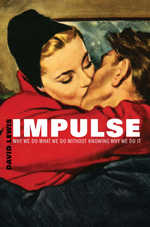
“It seemed like a good idea at the time” has been the limp excuse of many a person whose actions later became cause for regret. Although we see ourselves as rational beings, we are far more likely to act according to impulse than logic. Nor is this always a bad thing, David Lewis suggests. Impulse explores all the mystifying things people do despite knowing better, from blurting out indiscretions to falling for totally incompatible romantic partners. Informed by the latest research in neuropsychology, this eye-opening account explains why snap decisions so often govern—and occasionally enrich—our lives.
Lewis investigates two kinds of thinking that occur in the brain: one slow and reflective, the other fast but prone to error. In ways we cannot control, our mental tracks switch from the first type to the second, resulting in impulsive actions. This happens in that instant when the eyes of lovers meet, when the hand reaches for a must-have product that the pocketbook can’t afford, when “I really shouldn’t” have another drink becomes “Oh why not?” In these moments, our rational awareness takes a back seat.
While we inevitably lose self-control on occasion, Lewis says, this can also be desirable, leading to experiences we cherish but would certainly miss if we were always logical. Less about the ideal reasoning we fail to use than the flawed reasoning we manage to get by with, Impulse proves there is more to a healthy mental life than being as coolly calculating as possible.

Virginia Anderson edits the first published collection of these conversations. She pairs each interview with a contextual essay by a contemporary expert that shows how the composer's discussion with Childs fits into his life and work. Together, the interviewees cover a broad range of ideas and concerns around topics like education, notation, developments in electronic music, changing demands on performers, and tonal music.
Innovative and revealing, Interviews with American Composers is an artistic and historical snapshot of American music at an important crossroads.


How was frontier expansion rationalized in the Americas during the late nineteenth century? As new states fleshed out expanded national maps, how did they represent their advances? Were there any distinct pan-American patterns? The renowned anthropologist and human rights advocate David Maybury-Lewis saw the Latin American frontiers as relatively unknown physical spaces as well as unexplored academic “territory.” He invited eight specialists to explore public narratives of the expansion of Argentina, Brazil, Chile, and the western regions of Canada and the United States during the late nineteenth century, a time when those who then identified as “Americans” claimed territories in which indigenous peoples, who were now seen as economic and political obstacles, lived. The authors examine the narrative forms that stirred or rationalized expansion, and emphasize their impact on the native residents.
The authors illustrate the variety and the similarities of these nationalist ideas and experiences, which were generally expressed in symbolic and cultural terms rather than on simple materialist or essentialist grounds. The cases also point out that civic nationalism, often seem as inclusive and more benign than ethnic nationalism, can produce similarly destructive human and cultural ends. The essays thus suggest a view of nationalism as a theoretical concept, and of frontier expansion as a historical phenomenon.
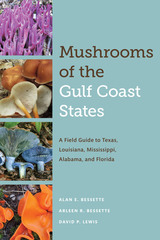
The weather patterns and topography of America's Gulf Coast create favorable growing conditions for thousands of species of mushrooms, but the complete region has generally gone uncharted when it comes to mycology. Mushrooms of the Gulf Coast States at last delivers an in-depth, high-quality, user-friendly field guide, featuring more than 1,000 common and lesser-known species—some of which are being illustrated in color for the first time.
Using easily identifiable characteristics and a color key, the authors enable anyone, whether amateur mushroom hunter or professional mycologist, to discern and learn about the numerous species of mushrooms encountered in Texas, Louisiana, Mississippi, Alabama, and Florida. Wild-food enthusiasts will appreciate the information on edibility or toxicity that accompanies each description, and they will also find the book’s detailed instructions for collecting, cleaning, testing, preserving, and cooking wild mushrooms to be of great interest. Providing encyclopedic knowledge in a handy format that fits in a backpack, Mushrooms of the Gulf Coast States is a must-have for any mushroom lover.

The indigenous people of the hemisphere have resisted a five-hundred-year assault, fighting to maintain their cultural identities. During this time, authorities in the Americas have insisted that the toleration of indigenous societies and cultures would undermine their respective states. In recent years, however, the nations of the Americas have started to reverse themselves. They are altering their constitutions and proclaiming themselves multiethnic. Why is this happening now? The Politics of Ethnicity: Indigenous Peoples in Latin American States, edited by David Maybury-Lewis, helps us understand the reasons and history behind these times of transition.
The book provides a valuable overview of current problems facing indigenous peoples in their relation with national states in Latin America, from the highlands of Mexico to the jungles of Brazil. The traditional, sometimes centuries old, relations between states and indigenous peoples are now changing and being rediscussed. The collection, authored by U.S. and Latin American anthropologists using interdisciplinary approaches, enables the reader to understand these recent developments in a comparative framework. An ambitious and quite thorough collection, it is brought together skillfully by one of the discipline’s maître penseurs.

While we know a great deal about the benefits of regional integration, there is a knowledge gap when it comes to areas with weak, dysfunctional, or nonexistent regional fabric in political and economic life. Further, deliberate “un-regioning,” applied by actors external as well as internal to a region, has also gone unnoticed despite its increasingly sophisticated modern application by Russia in its peripheries.
This volume helps us understand what Anna Ohanyan calls “fractured regions” and their consequences for contemporary global security. Ohanyan introduces a theory of regional fracture to explain how and why regions come apart, consolidate dysfunctional ties within the region, and foster weak states. Russia Abroad specifically examines how Russia employs regional fracture as a strategy to keep states on its periphery in Eurasia and the Middle East weak and in Russia's orbit. It argues that the level of regional maturity in Russia’s vast vicinities is an important determinant of Russian foreign policy in the emergent multipolar world order.
Many of these fractured regions become global security threats because weak states are more likely to be hubs of transnational crime, havens for militants, or sites of protracted conflict. The regional fracture theory is offered as a fresh perspective about the post-American world and a way to broaden international relations scholarship on comparative regionalism.

READERS
Browse our collection.
PUBLISHERS
See BiblioVault's publisher services.
STUDENT SERVICES
Files for college accessibility offices.
UChicago Accessibility Resources
home | accessibility | search | about | contact us
BiblioVault ® 2001 - 2024
The University of Chicago Press









